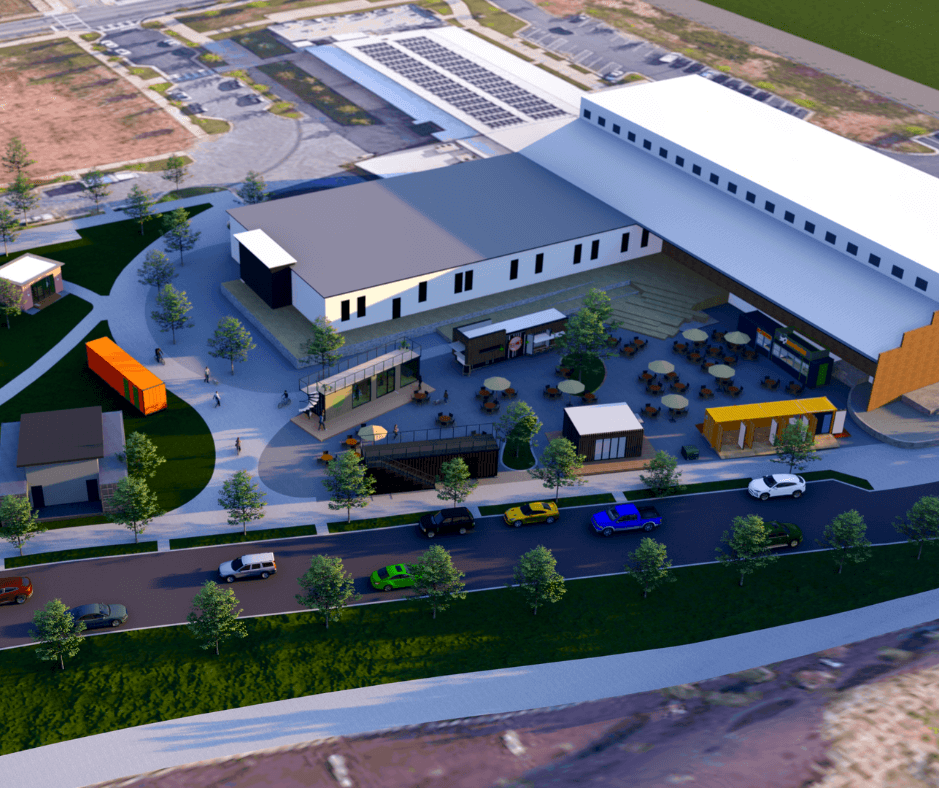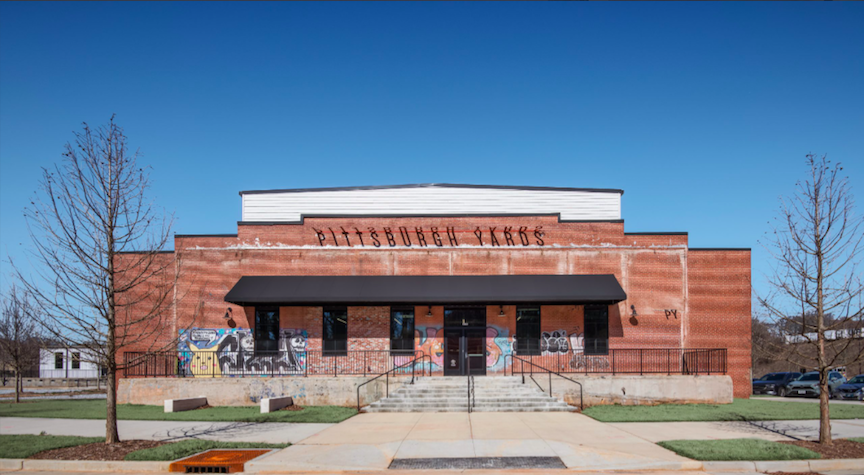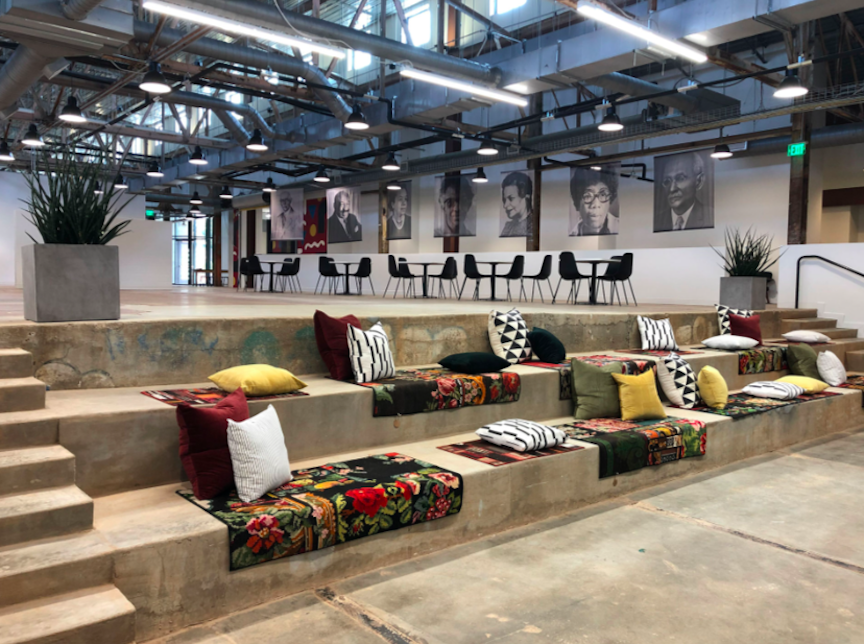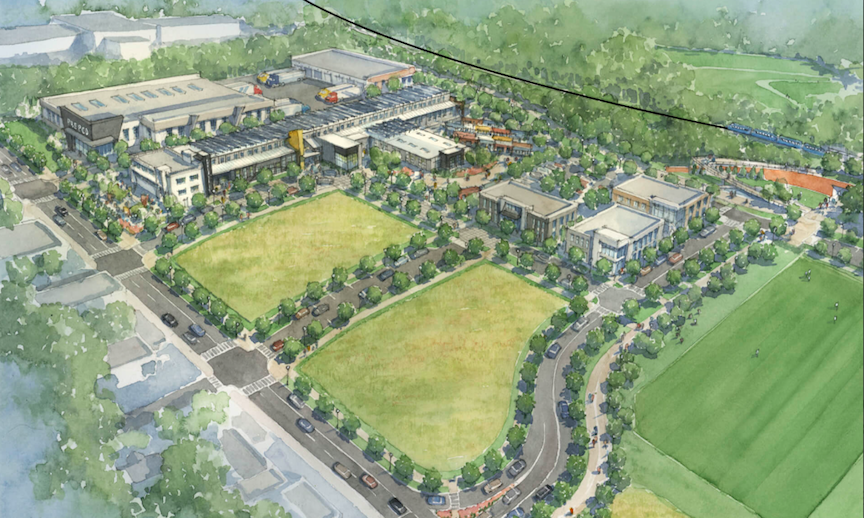A year after Pittsburgh Yards cut the proverbial ribbon on its first phase, the adaptive-reuse, community-boosting jobs hub south of downtown is gearing up to add food and retail to its mix.
Pittsburgh Yards reps have shared a first look at the next component of phase-one development on University Avenue in the historic Pittsburgh neighborhood: a BeltLine-adjacent commercial village to be called the “Container Courtyard.”
Tentative plans call for opening the Container Courtyard—positioned between current Pittsburgh Yards workspaces and offices and the first completed section of BeltLine’s Southside Trail—next spring.
The goal is to provide 10 local businesses with a permanent location, with a focus on food and retail in spaces designed by Atelier 7 Architects, project officials tell Urbanize Atlanta.
 Container Courtyard plans eventually call for nine permanent businesses on site near the Beltline. Courtesy of Pittsburgh Yards; designs, Atelier 7 Architects
Container Courtyard plans eventually call for nine permanent businesses on site near the Beltline. Courtesy of Pittsburgh Yards; designs, Atelier 7 Architects
The 31-acre Pittsburgh Yards property is unique among BeltLine-bordering projects in that it’s geared specifically toward benefiting the surrounding communities of Summerhill, Pittsburgh, Mechanicsville, Capitol View, Adair Park, Capitol View Gateway, and Peoplestown. Since the outset, the goal has been to create a bustling commercial anchor where baristas, graphic designers, and food entrepreneurs work under the same roofs as carpenters, welders, jewelry-makers, and other tradespeople, many of them able to walk a short distance from home to work.
The Annie E. Casey Foundation—a philanthropic organization named for the mother of UPS founder Jim Casey that aims to better the lives of American children—bought the site for $4.2 million in 2006. The Great Recession threw plans to remake it off track, but by 2018, construction on the initial, $26-million first phase had launched, just as the BeltLine was purchasing the former CSX railroad corridor next door to build the Southside Trail.
 The main building's Beltline-adjacent facade, with branding made of shadows. Pittsburgh Yards/The Annie E. Casey Foundation
The main building's Beltline-adjacent facade, with branding made of shadows. Pittsburgh Yards/The Annie E. Casey Foundation
 Tiered seating in an interior events space at Pittsburgh Yards. Pittsburgh Yards/The Annie E. Casey Foundation
Tiered seating in an interior events space at Pittsburgh Yards. Pittsburgh Yards/The Annie E. Casey Foundation
Beyond the Container Courtyard, Pittsburgh Yards officials have begun marketing cleared pad sites for development just west of buildings in use today. Those include The Nia Building, a 61,000-square-foot small business and maker hub named for a Swahili term meaning “purpose.”
Roughly 16 acres remain available for development, in addition to five building-ready sites created in the first round of construction. “[We’re] looking for more investors to bring the next phases of construction to life,” reads a statement provided to Urbanize, “more businesses to bring their talents to The Nia Building, and community members to support these enterprises.”
At existing buildings, Pittsburgh Yards’ private offices are currently 83 percent occupied, and 60 coworking members have signed up for other versatile spaces, according to a project rep.
 Plans for the full Pittsburgh Yards buildout and adjacent greenspace. Pittsburgh Yards/The Annie E. Casey Foundation
Plans for the full Pittsburgh Yards buildout and adjacent greenspace. Pittsburgh Yards/The Annie E. Casey Foundation
Businesses and individuals that have set up shop at Pittsburgh Yards so far include (deep breath) after-school services, artists, architecture professionals, boutique clothing makers, fitness and wellness pros, “foodpreneurs,” herbal tea purveyors, legal services, not-for-profits, real estate and tax services, photographers, interior designers, insurance and financial firms, and urban gardeners, among others.
Head up to the gallery for more context and a glimpse at what the future holds in Pittsburgh.
• In Atlanta's Pittsburgh neighborhood, $400K+ sales are becoming normal (Urbanize Atlanta)






